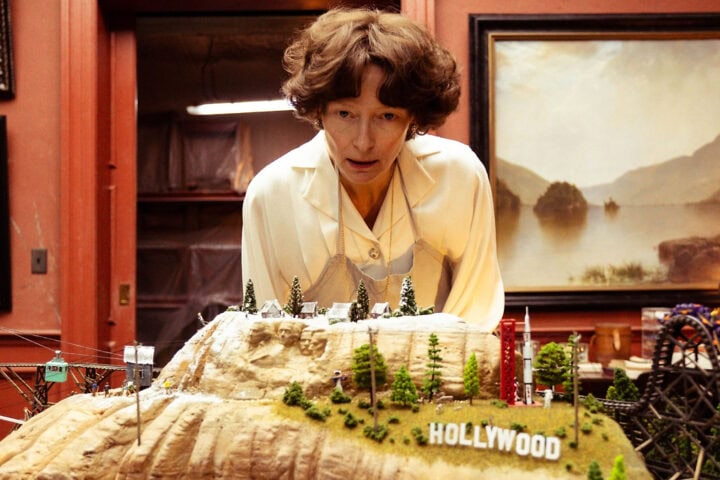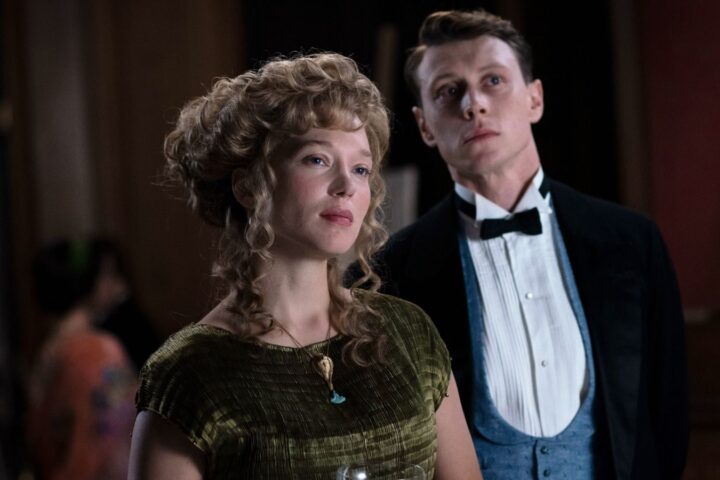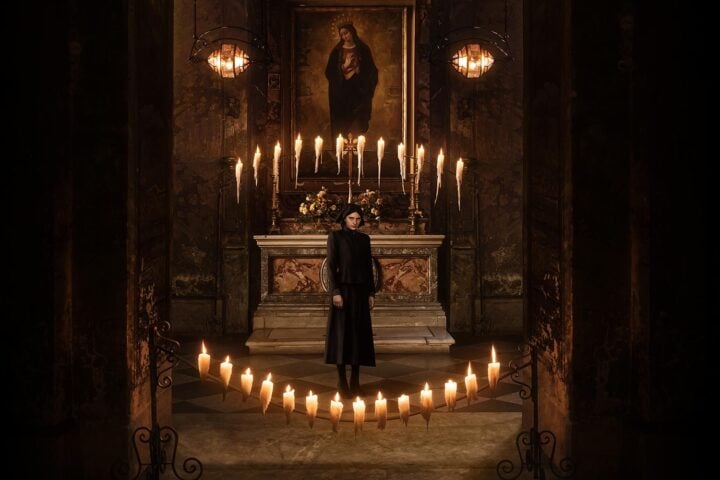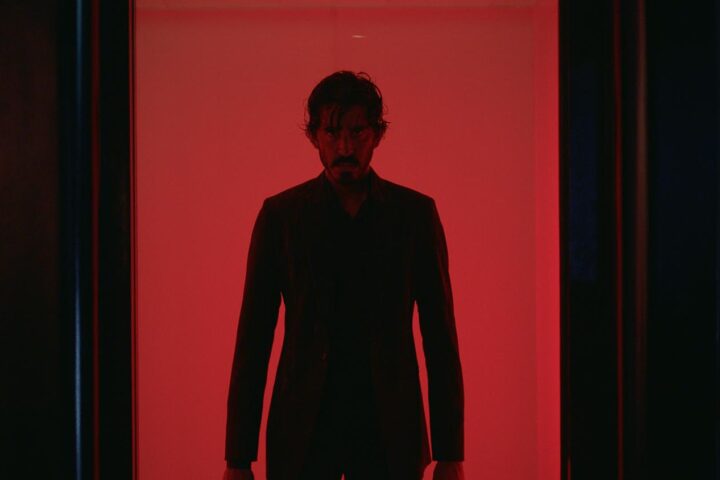At least stateside, audiences will experience Femme and The Beast, both starring George MacKay, as near-simultaneous releases. The 32-year-old British actor has been a presence for over two decades dating back to his film debut as a Lost Boy in 2003’s adaptation of Peter Pan. He grew up on screen in films like 2008’s Defiance, 2014’s Pride, and 2016’s Captain Fantastic. Twenty nineteen proved a breakthrough year for MacKay as a leading man, playing a heroic soldier on a mission in 1917 and delivering a brooding, brutal interpretation of Australian urban legend Ned Kelly in True History of the Kelly Gang.
MacKay’s latest one-two punch features elements familiar from his previous standout roles and elevates them to new heights. In Sam H. Freeman and Ng Choon Ping’s Femme, he’s electric as Preston, a hardened hypebeast in contemporary London who harbors a secret identity. The character is drawn out of the closet by Nathan Stewart-Jarrett’s Jules, who—unbeknownst to Preston—he had assaulted when the performer was in drag. The way each man clings to a stubborn secret gives their erotic relationship a charge of real danger.
In Bertrand Bonello’s The Beast, though, MacKay manages to one-up playing a two-faced character. His Louis Lewanski is torn between fear and love across three distinct time periods—1910, 2014, and 2044. But that core tension manifests itself differently in each as he embodies, opposite Léa Seydoux’s Gabrielle, a Belle Epoque gentleman, a pre-MeToo incel, and a futuristic bureaucrat. MacKay shades each Louis with the respective genre trappings of melodrama, thriller, and science-fiction while maintaining an impressive continuity of character throughout.
I spoke with MacKay in the lead-up to The Beast’s American release. Our conversation covered the connections between his two latest performances, the larger thematic fascination with identity in his work, and discovering the character(s) of Louis in conversations with Bonello.
Do you view Femme and The Beast as exploring two sides of the same coin?
I guess the figurative coin that unites them is exploring this idea of what makes a person and not necessarily giving answers in either. I think this is maybe a broad-brushstrokes answer to every character. But what is someone at their core? How much is their context or what they put out into the world? What is the truth of that? In relation to Preston, you’ve basically got someone whose armor has become a projection. He’s taken one aspect of his inside to cover another part that he doesn’t want people to see, and he’s built this kind of secondary identity that hides this inner identity. And then with Louis, the fact that there are three characters who are essentially the same person, but there’s one core theme that runs through them. Because of the context in the time, location, and circumstance, they’ve become three entirely different people.
There’s been such tension in your performances of young men who are trying to grow up but can’t quite escape the shadow of a past generation. Now in both these films, Preston and Louis are very much their own men, but they’re still stunted in adolescence in many ways. Are you thinking about this at all as a larger statement on the challenges and contradictions of modern masculinity?
Man, that’s really perceptive. You’ve got a read on me that I didn’t know! Yeah, basically, I had a family two years ago, and that made me ask tons of questions as to like, “Alright, I’ve bringing wee ones into the world, I want to be solid in myself. These are the things that I can feel solid about in terms of what it is to be a man.” Regardless of those personal questions or explorations, then it’s like, “Well, what makes what makes a person?” I always am a bit wary of speaking about it in those terms because it’s a very finite part of the world.
But even just being part of 1917, we did a lot of press, more than I’ve ever done before. And you sort of realize at points going, “Okay, I’m only giving this part of myself over.” I was perceived to be so busy around that time, and it’s the longest I’ve not worked in terms of actually doing acting. It’s nearly a year because we were on the road talking about acting. It was like a fundamental thing of going, “Oh, so when people see this thing, this other thing is going on.”
And that’s how I take in the world. Because [people] want to assume that when an actor is talking on TV, they must have just finished that role. And you go, “No, mate, that was two years ago!” It just has cracked open this question as to what is real. [laughs] Without sounding too existential, I think it’s a fundamental question in terms of navigating growing up. Also leaving adolescence and carving your own path as an individual, then you become responsible for those choices as well. You’re no longer your parents’ kid or this school student—you are you. And you are either carving that out and making choices about what you show and what you don’t show or having that carved out for you. I don’t have an answer to it, necessarily, but it just feels like the combination of having a family a few years ago and seeing a fundamental shift in what people see not being real to the true experience inside of that.
What’s the long-term effect of working on a film like 1917 where you have to be hyper-aware of the camera? I felt like I was seeing a lot of that applied to the way Louis can ominously lurk and hold space in the frame.
1917 gave me a sort of real technical awareness that I think is really useful. Like all things, [it’s] like a toolbox. Some jobs, they’re relevant. You’re like, “Oh, great, I know how to use that tool, so I’ll use it.” And other times you go, “Well, you know, we’re screwing something in, so I’m not going to hit it with a hammer.” It definitely gave me an awareness and [taught me to] not to be afraid. The lesson was to embrace a technical awareness for the benefit of the final piece. I think there’s a purist view that you’re just being the character, and you shouldn’t know [where] the camera is. I think there’s great truth to that. But in certain circumstances, the camera needs access to those thoughts. That was useful for The Beast because Bertrand is such a visual director. Having experienced 1917 made me more at peace with being able to bring my ideas to the set structure that Bertrand required to achieve a shot.
You and Bertrand wrote letters to each other where he’d respond to your questions about who the character is. What were you asking, and how did he help you discover the character?
My questions were all about trying to be really specific in distilling the through line of these three men. That goes back to the source material that was an entirely different story, but the seed of the idea is Henry James’s The Beast in the Jungle. The main question was what the beast was, and committing to the idea that the beast was the fear of love and, in a sense, the fear of commitment that comes when you are met with a great love. Therefore, once we dialed that down, it’s then almost reverse engineering. I sense Bertrand knew all of this already, but just for me to understand it, I was double-checking, like, “Okay, well then why is he so romantic in 1910?” Maybe it’s because he fears the big stuff, but up until you make those big declarations and big commitments, he operates really easily in that kind of more flirtatious zone. Because he is someone who is not responsible, in potentially the way that great lovers or affairs are. Their lack of responsibility makes them so passionate. That’s how I got to the 1910 version.
Then [for the] 2014 [version], Bertrand discussed a lot about the specificity of Louis Lewanski in that one being American. So much of the culture seems to be about achievement, and for someone who’s rooted in a fear or fundamental insecurity, [he] feels really overwhelmed by that. The only way to conquer that is to go strongly against that and do battle with it. And that’s where you get the spiteful nature of that Louis. The conversations were just about nailing down the core of these three people that are, on the surface, entirely different?
Would you let the knowledge of future actions influence the way you played other sections?
I find it satisfying to try and thread through certain future aspects. But the most truthful thing was just to play them in that relevant context. There’s one scene in 2044, where they meet at the 1970s club—so many time zones—and they have that conversation and Louis says, “I’m still not sure if I’m going to do it or not. I don’t know if I can take these anxiety attacks. And I’m thinking about the stoics.” Then, she touches his hand, and he has this moment where he’s overwhelmed but doesn’t fully remember why. But it was really important for me to know that what I was feeling was the touch from 1910. There’s something in my being that, when she touches my hand in that way, I have such an overwhelming sense of love. And with that love comes a fear. That’s being specific about the overwhelm that I’m feeling. But also, because he’s into it in 2044, he doesn’t actually away know what it’s from. At that point, he has a surge of feeling.
That’s where it’s relevant: He’s totally of his time, but if he was totally of 2044 and there was no relevance to the past, if she touches his hand, we shake hands to say hello in the future. It means nothing. But the touch of her hand, in that moment, gives him the thrill that he felt in 1910. Because he’s in the future, he doesn’t fully understand that echo.
In the past, you’ve said that you’re intrigued by America as a subject. What did playing the very specifically American character of 2014 Louis, inside a French production, reveal about the country to you?
Bertrand always said that he felt that Louis had to be American because of the culture of high achievement. So, I followed it in those terms. Every time I come here, I’m struck by the scale of the place. That’s not a positive or a negative. I’ve spent a few days in New York, and on such a tiny island, buildings take up an entire block. They’re just bigger than in Europe, and I know that sounds so simple, but you have to occupy more space. Cars are bigger, people’s shoulders are broader, voices are louder. Again, it’s not a good or a bad thing, but occupying space becomes more natural. Maybe that’s unfair, but it feels like a fundamentally American thing.
Where it was relevant to this Louis, someone who’s fundamentally insecure, [is that he] really struggles with occupying that space with what’s asked of him on a purely day-to-day level. Then, to be, in the rules of the jungle, the big lion or most virile of mates, you have to be the biggest and the strongest. If, just to meet base level, he’s already punching above his weight, he feels exhausted and despairing at the idea of being any more than just normal. That’s where it was relevant to that Louis, but I didn’t study, so I don’t think it’d be fair to comment on American culture now. It was so finite, my understanding of it for this.
With both Femme and The Beast, what’s the balance of understanding and depicting a character’s internalized homophobia and racism or misogyny, respectively, without excusing it or explaining it away?
The terms “misogynistic,” “homophobic,” “racist,” I guess there is a through line to all three. What changes is the person, the human, the way of being that it’s directed at it. I’m really wary of explaining away all three flippantly, but what I’m trying to say is that in terms of The Beast, which is where this conversation roots, is about a fear. And that fear, that sort of spite, anger, and aggression, is almost an animal sense that comes out of a need for self-protection. It comes out of a sort of [fear] I’m going to be hurt by this, and the reason why someone feels they might be hurt by it is individual and a much bigger, sprawling question. But in enacting those things, I have to be truthful that the character doesn’t think that they’re doing that specific thing.
I don’t think that Preston or any of these characters think they’re doing it in those terms. In the situation that there is, he’s trying to survive it. With Preston, [he thinks], “After you embarrass me in front of my friends at the shop, if you embarrass me anymore, my friends are going to know that I’m not the person that they think I am. I cannot have that happen.” In the modern sense, it feels like there’s a secondary identity that comes with the perception of who we put out on the internet or who we are over a text message. This secondary self that’s becoming so prevalent has an almost mortal quality. Therefore, thinking about it in terms of a mortal life and death is how I approached it with the characters.
If this secondary self that I’ve built goes, I die with it, and therefore I’ll defend it with my life. Just thinking about it in those terms removes any stigma within myself about how I feel about saying or doing those things. I just think of it purely in those terms, and then the context within which it’s played turns it into that specific thing that you mentioned.
On the note of the animalistic, I think there are seeds of Louis in Jacob, your character in Wolf who has this strong inner vision of himself that he cannot get the world around him to accept. Was that a foundation you were able to build on?
I’m sure there are through lines that can either be drawn from an outsider or are subconscious things that I myself have not spotted. I tried not to think this is a stepping stone from this equivalent question or being. I didn’t sort of consciously have anything in my head in the doing of it, but it’s totally up for interpretation. I welcome if people see a through line between the two.
Since 2001, we've brought you uncompromising, candid takes on the world of film, music, television, video games, theater, and more. Independently owned and operated publications like Slant have been hit hard in recent years, but we’re committed to keeping our content free and accessible—meaning no paywalls or fees.
If you like what we do, please consider subscribing to our Patreon or making a donation.





